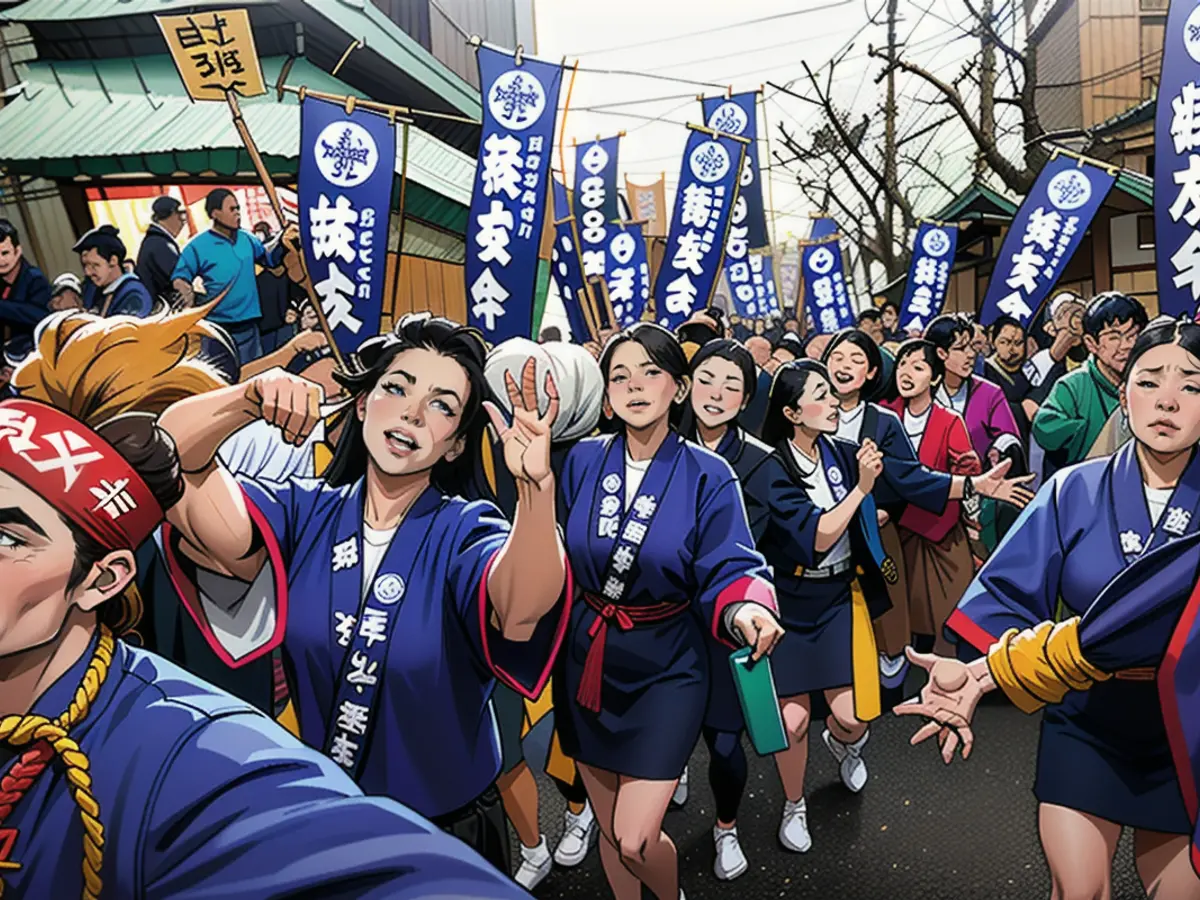Women's involvement in the 'naked festival' indicates the impact of aging on changing male-dominated Japanese customs.
Throughout Japan during cold winters, numerous men rid themselves of their clothing, save for a delicate cloth covering their crotch, and compete to get close to a man portraying a divine figure known as "shin-otoko," who banishes misfortune. This ritual exemplifies Japan's strong reverence for its cultural past. However, it also underscores a significant contemporary conflict: gender inequality.
Nowadays, men assume the nation's leadership positions at its top companies and hold the most prominent roles. Last year, the World Economic Forum ranked Japan 125th in its Global Gender Gap Index, falling short of other major economies like Germany, Britain, and the United States. It was only a few spots above India and Saudi Arabia, which both rank low in women's rights.
Some females in Japan continue to face expectations to take on the role of a "shufu," or housewife, as per cultural norms. Plus, long working hours and an establishment geared toward men aggravate women, who are typically saddled with additional domestic chores than males.
Yet, in this traditional event, women have discovered a glimmer of hope. Last year, the ancient hadaka matsuri, held at Konomiya Shrine in central Japan, welcomed 41 women for the first time, as the number of attendants dropped due to the shortage of male participants.
Explaining the reason behind including women in this tradition, Mikiko Eto, former professor specializing in gender politics at Hosei University in Tokyo, said, "The country is facing a severe shortage of men. We've been quite welcoming since there are few young men participating."
Haruhiko Nishio, a 57-year-old part of an alumni club for shin-otoko organizing the hadaka matsuri at the Konomiya Shrine, noted, "Last year, there were only 1,700 attendees, which is just one-fifth of pre-pandemic crowds." The female group, called Enyukai, participated in secondary roles (while keeping their clothes on) but saw profound significance in their involvement in a historically male-dominated tradition.
A participant, Atsuko Tamakoshi, 56, expressed her desire to unleash the full potential of women: "Japan can’t help but put men at the front and women in the back. I want to unleash female power from now on."
Vice president of Enyukai, Ayaka Suzuki, 36, stated, "It’s about making progress toward gender equality."
However, the changes might not be mere coincidences prompted by the decreased population and gender inequality concerns. Experts believe Japan's declining birth rates and scarcity of male participants might cause lasting alterations to this festival and even affect the country's overall economic landscape.

Scholars like Eto view the decreasing number of inhabitants as an opportunity for women to achieve parity in society. She remarked, "The impact of an aging society is crucial for Japan's economy. You need more working people; more active people. But why are women still at home? Let women participate in the labor market."
"Aging society could be a chance for women to obtain gender equality, as our society needs more competent individuals," Eto added.
Japan's number of births dipped for the eighth consecutive year in 2023, dropping 5.1% from the year before to an all-time low of 758,631, mirroring Ministry of Health statistics. With a fertility rate lingering around 1.3 in recent years—well below the 2.1 threshold to sustain a stable population (Japan has limited immigration)—the government has characterized its effort to boost births as a matter of "now or never."
However, Japan's population dwindling may not only impact age-old customs like the naked festival; it could also change the world's fourth-largest economy.
Eto believes the consequences would extend beyond rural towns and these rituals. According to Japan's Ministry of Health, the population is projected to decrease from its current 66 million to roughly 32 million by the turn of the century if the fertility rate fails to improve.
As the population predicament intensifies, both the government and businesses are examining why women remain confined to their homes, Eto claimed.
While there have been advancements, according to Eto, they may be more pragmatic than progressive.
Several companies are striving for raises in gender equality in work situations to attract more women. The government has introduced measures to lessen mothers' responsibilities, including a plan to persuade 85% of male employees to use paternity leave by 2030 for a more equitable division of domestic tasks.

Female leaders in Japan include Mitsuko Tottori, who became president and CEO of Japan Airlines on April 1, making her the first woman to hold this position. In September of the same year, Yoko Kamikawa was appointed as foreign minister, the first woman to take on this role in two decades.
Despite these achievements, women's representation in politics and management is still disappointingly low, according to experts. Out of the 20-member cabinet led by Prime Minister Fumio Kishida, only five members are women. In 2023, the Global Gender Gap report revealed that less than 13% of senior and leadership roles in businesses were occupied by women.
Eto, an unspecified person, asserts that a lack of progressive policies, like quota systems for women implemented in some European countries, is hindering Japan's progress.
Professor Kaori Katada from Hosei University explained that while women in Japan are presented with more chances, gender bias and societal expectations continue to hinder their advancement. Women tend to fill roles in entry-level positions and caretaking jobs, such as preschool teachers and nurses, and they generally earn less than their male colleagues.
Furthermore, women are often relegated to part-time employment as their domestic responsibilities demand their attention. As a result, they are unable to take on high-pressure managerial positions.
Even in activities like the hadaka matsuri at Konomiya Shrine, women are still accorded less respect, while those who tried entering the male-dominated realm of sumo wrestling faced considerable resistance.
Hiyori Kon, a 26-year-old top amateur sumo wrestler and the protagonist in the 2018 Netflix documentary "Little Miss Sumo," shares her experiences with societal disapproval, reminding us that Japan's journey toward gender equality has a long way to go. Her male colleague once told her, "If you continue with sumo, you won't be able to get married, so you better quit soon."


Read also:
- This will change in December
- Dikes withstand water masses so far - Scholz holds out the prospect of help
- Fireworks and parties ring in 2024 - turn of the year overshadowed by conflicts
- Attacks on ships in the Red Sea: shipping companies avoid important trade route
Despite Japan's strong reverence for its cultural past, as evident in the 'naked festival', its Global Gender Gap Index ranking of 125 indicates a significant gender inequality issue in the world.
With the decreasing population and scarcity of male participants, traditions like the 'naked festival' may undergo lasting alterations, potentially affecting not only Japan's economy but also the world's fourth-largest economy.
Source: edition.cnn.com







